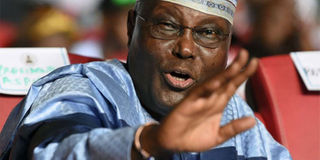Fifth time's a charm? Nigeria's politician to challenge Buhari for top seat

Former Nigerian Vice-President Atiku Abubakar speaks during the opposition People's Democratic Party's national convention in Port Harcourt, Rivers State on October 6, 2018. PHOTO | AFP
What you need to know:
- His candidacy has attracted support, scorn and controversy
- Politician, who rose from humble beginnings, faces corruption allegations
- But he is also credited with backing of education initiatives, including the creation of the high profile American University of Nigeria in Adamawa State.
LAGOS,
A dogged political veteran, Nigeria's former vice-president Atiku Abubakar is the nearly man of Nigerian politics, whose repeat bids for the presidency have attracted support, scorn and controversy.
Having already stood four times for the top job without success, the 71-year-old was nominated by the main opposition PDP party on Sunday to take on President Muhammadu Buhari in February's election.
GRAFT CLAIMS
Abubakar is credited with having a network of support that could stand his challenge in good stead, as well some goodwill due to his backing of education initiatives, including the creation of the high profile American University of Nigeria in Adamawa State.
But questions over his business interests and repeat allegations of corruption - which he has denied - could potentially harm his presidential ambitions in a country fed up with corruption.
Born in the country's north, Abubakar rose from humble beginnings to become head of the customs service during two decades of military rule in the late 20th century.
The job gave him power and influence, and in 1984 he was accused of allowing a powerful northern leader to pass through Lagos airport unchecked with suitcases stuffed full with cash.
Even for a country used to scandal, the incident caused a furore and Abubakar had to defend himself against claims of flagrantly violating Nigeria's currency import laws.
Amid the corruption allegations, Abubakar is thought to have earned enormous wealth during his time at the customs service and later expanded his business interests into oil, agriculture and other sectors.
EMERGED UNSCATHED
He also developed political interests and first made a tilt at the presidency in 1993 where he lost out in the primaries to tycoon Moshood Abiola.
But by the time democratic rule returned to Nigeria in 1999, Abubakar had the profile and stature to become vice-president to civilian president Olusegun Obasanjo for the PDP.
The pair were in office for eight years, with Abubakar heading the state-run privatisation agency that oversaw the sale of hundreds of loss-making, corrupt or poorly-managed public firms.
Critics claimed Abubakar also profited on the side, making millions of dollars from corruption, abuse of office and influence-peddling.
And in 2005 the FBI raided Abubakar's home outside Washington, apparently as part of an investigation into a telecom deal involving former Louisiana congressman William Jefferson.
Jefferson was later convicted on corruption-related charges but Abubakar, who denied wrong-doing, emerged from the scandal largely unscathed. He has repeatedly denied allegations of corruption and challenged anyone with evidence to come forward.
POLITICAL FALLINGOUT
In 2006, three years into their second term in office, relations between Obasanjo and Abubakar soured over the former's apparent plan to seek a third mandate - contrary to the constitution.
Abubakar left the PDP and ran for president himself, fighting a Supreme Court battle over his candidacy for the 2007 election due to allegations he had been indicted in a corruption investigation.
He eventually was allowed to stand, but finished third behind winner Umaru Musa Yar'Adua and Buhari.
Four years later - and back with the PDP - Abubakar challenged Yar'Adua's deputy Goodluck Jonathan for the presidential ticket but again lost.
Reflecting the yo-yo nature of his political allegiances, Abubakar again quit the PDP in February 2014 to join Buhari's opposition APC party, describing it as "a party of change" and vowed to reform government, improve security and "reconcile the nation".
But following Buhari's ascent to power, Abubakar defected and switched back to the PDP in December 2017, alleging the 75-year-old president had "let the Nigerian people, and especially our young people, down".
In September, he called the president, a former military ruler, "uncompromising" and "power drunk" - opening skirmishes in an election battle where each will seek to prove they have what it takes to govern Africa's largest economy.





